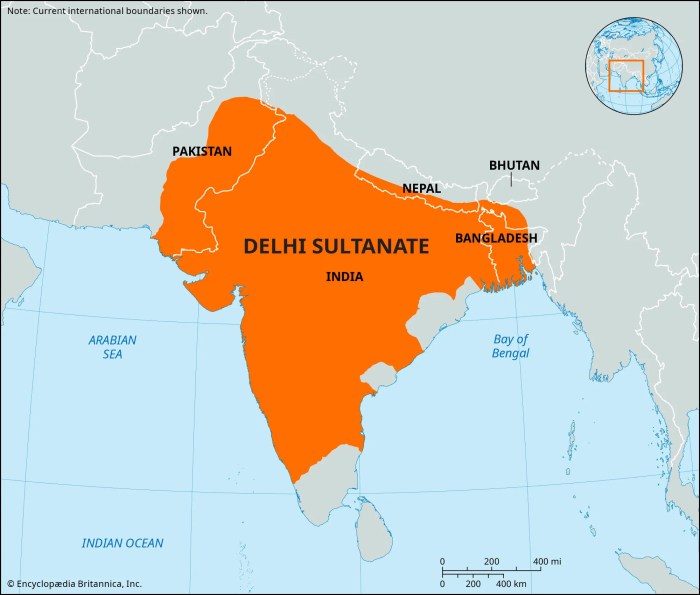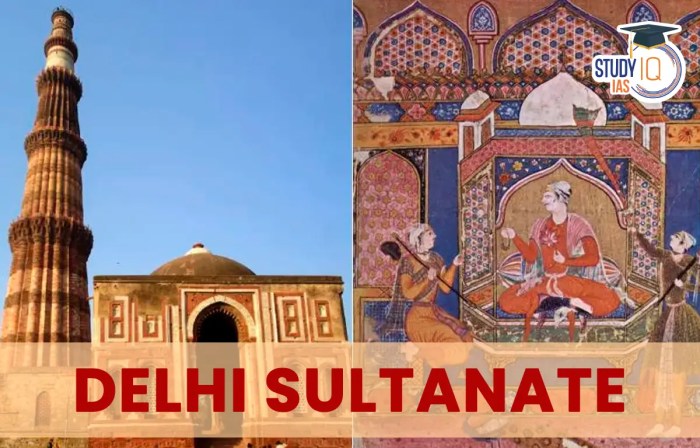Delhi sultanate significance ap world history – The Delhi Sultanate, a powerful empire that ruled over northern India from the 13th to the 16th centuries, played a pivotal role in shaping the political, economic, social, and cultural landscape of the region and beyond. Its significance extends far beyond its geographical borders, leaving a lasting legacy on world history.
The Delhi Sultanate emerged as a dominant force in the aftermath of the collapse of the Delhi Sultanate, establishing a centralized government and expanding its territories through military conquests. The Sultans implemented innovative military strategies and forged alliances, transforming the Delhi Sultanate into a formidable regional power.
Political and Military Significance

The Delhi Sultanate, established in 1206, emerged as a powerful empire that played a pivotal role in shaping the political and military landscape of South Asia. The Sultans expanded their territory through a series of conquests, consolidating their control over a vast region.
Establishment and Expansion
The foundation of the Delhi Sultanate was laid by Qutb-ud-din Aibak, a former slave general of Muhammad of Ghor. Aibak’s successors continued the expansion of the empire, conquering new territories and establishing a centralized administration.
Military Strategies and Conquests
The Delhi Sultans employed various military strategies to achieve their conquests. They utilized a combination of cavalry, infantry, and siege warfare, often outmaneuvering their opponents with superior tactics and weaponry. The Sultans also adopted new technologies, such as gunpowder and cannon, which gave them an advantage in battles.
Impact on Regional and Global Politics, Delhi sultanate significance ap world history
The establishment of the Delhi Sultanate had a profound impact on regional and global politics. The empire became a major player in the trade routes between Asia and Europe, controlling access to valuable goods and resources. The Delhi Sultans also established diplomatic relations with other powers, including the Mamluk Sultanate of Egypt and the Mongol Empire.
Economic and Social Impact
The Delhi Sultanate brought about significant economic and social changes to the region. The empire fostered trade and commerce, creating a prosperous economy that attracted merchants from far and wide.
Economic System and Trade Networks
The Delhi Sultans implemented an efficient economic system based on agriculture, trade, and taxation. They established a stable currency and developed an extensive network of trade routes, facilitating the exchange of goods between different regions of the empire and beyond.
Social Structure
The social structure of the Delhi Sultanate was hierarchical, with the Sultan at the apex. The society was divided into various social classes, including nobles, merchants, artisans, and peasants. The Delhi Sultans also introduced a system of land tenure, which regulated the ownership and use of agricultural land.
Cultural Exchanges and Influences
The Delhi Sultanate was a melting pot of cultures, where different religious and ethnic groups interacted and influenced each other. The empire witnessed the exchange of ideas, art, and literature, leading to the development of a distinct Indo-Islamic culture.
Architectural and Artistic Achievements

The Delhi Sultanate is renowned for its architectural and artistic achievements, which reflect the fusion of Islamic and Indian traditions. The empire produced magnificent forts, mosques, and tombs that showcased the skill and creativity of its artisans.
Architectural Marvels
The Delhi Sultans constructed imposing forts, such as the Red Fort and Tughlaqabad Fort, which served as symbols of their power and military prowess. They also built numerous mosques, including the Quwwat-ul-Islam Mosque and the Jama Masjid, which are architectural masterpieces that combine Islamic and Indian architectural elements.
Unique Artistic Styles and Techniques
The Delhi Sultanate developed unique artistic styles and techniques. Artists employed intricate carvings, calligraphy, and tilework to decorate buildings and objects. The empire also witnessed the emergence of miniature painting, which became a significant art form in later periods.
Cultural and Historical Significance
The architectural and artistic creations of the Delhi Sultanate have immense cultural and historical significance. They represent the artistic and technological advancements of the period and provide insights into the society and culture of the Delhi Sultanate.
Religious and Intellectual Developments
The Delhi Sultanate played a significant role in the development of Islam in South Asia. The Sultans promoted the spread of Islam, while also patronizing scholars and intellectuals.
Role of Islam
Islam became the dominant religion in the Delhi Sultanate, shaping the political, social, and cultural life of the empire. The Sultans established a legal system based on Islamic law and encouraged the construction of mosques and madrasas (Islamic schools).
Sufi Mysticism
Sufi mysticism, a mystical branch of Islam, flourished under the Delhi Sultanate. Sufi saints, such as Nizamuddin Auliya and Amir Khusrau, gained widespread popularity and influence, promoting spiritual practices and a message of love and tolerance.
Contributions of Scholars and Intellectuals
The Delhi Sultanate was a center of intellectual and scholarly activity. Scholars made significant contributions to fields such as medicine, mathematics, astronomy, and literature. The empire also witnessed the development of new literary forms, including the ghazal and qawwali.
Impact on World History

The Delhi Sultanate left a lasting legacy on world history. It was a powerful empire that played a significant role in the development of South Asia and beyond.
Comparison to Contemporary Empires
The Delhi Sultanate can be compared to other contemporary empires, such as the Mongol Empire and the Mamluk Sultanate of Egypt. While each empire had its unique characteristics, they shared similarities in terms of their political and military power, economic prosperity, and cultural achievements.
Legacy and Influence
The Delhi Sultanate’s legacy extended beyond its political boundaries. The empire’s administrative system, cultural traditions, and architectural marvels influenced subsequent historical developments in South Asia and beyond.
Contributions to Global Trade, Cultural Exchange, and Political Thought
The Delhi Sultanate contributed to global trade by connecting Asia and Europe through its extensive trade networks. The empire also facilitated cultural exchange between different regions, leading to the transmission of ideas and artistic styles. The political thought and administrative practices of the Delhi Sultanate influenced the development of subsequent empires in South Asia.
FAQ Overview: Delhi Sultanate Significance Ap World History
What were the major political achievements of the Delhi Sultanate?
The Delhi Sultanate established a centralized government, expanded its territories through military conquests, and implemented innovative military strategies.
How did the Delhi Sultanate impact the economy of the region?
The Delhi Sultanate fostered trade networks, introduced new agricultural techniques, and developed a robust economic system.
What are some of the architectural marvels built during the Delhi Sultanate period?
The Delhi Sultanate is renowned for its architectural achievements, including forts, mosques, and tombs, showcasing unique artistic styles and techniques.




